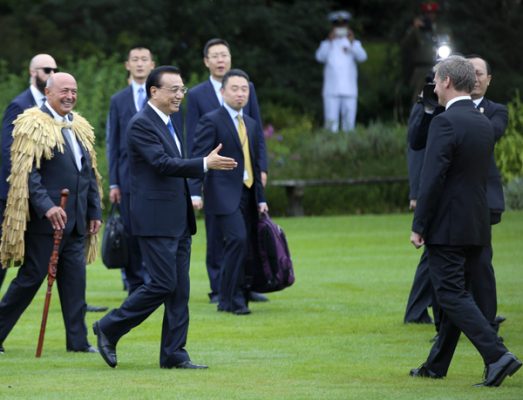
New Zealand became on Monday the first Western developed economy to sign a memorandum of understanding to align with China’s Belt and Road Initiative during Premier Li Keqiang’s visit to the country.
Li and his New Zealand counterpart, Prime Minister Bill English, were on hand as the document was signed. It was one of 13 agreements the two countries signed to boost cooperation in fields such as customs clearance, education, fisheries and food exports.
The initiative, proposed by President Xi Jinping in 2013, comprises the Silk Road Economic Belt and the 21st Century Maritime Silk Road. It aims to build a trade and infrastructure network connecting Asia with Europe and Africa along and beyond the ancient Silk Road trade routes.
China and New Zealand will explore the possibilities of cooperation in various fields to promote interconnectivity between the two countries, Li said at a joint news conference.
In November, Latvia became the first European Union country to sign such a document when Li visited the Baltic country and attended the Fifth Leaders’ Meeting between China and Central and Eastern European Countries.
Under two other agreements, China will start importing iced fresh beef and lamb from New Zealand in “a stable and orderly way” and exporting onions to the island country.
“We are willing to expand imports of iced-fresh beef to give Chinese consumers more choices for higher quality goods. New Zealand is also welcome to import Chinese onions,” Li said.
Meanwhile, English said he exchanged views with the premier on regional stability and free trade, in addition to other topics such as culture and business. He also said the first round of negotiations on the upgrade of the China-New Zealand free trade agreement will be conducted on April 25 to 27.
The nine-year free trade agreement has boosted bilateral trade, English said. For example, half of China’s imported dairy goods are from New Zealand. The negotiations will be beneficial to boosting bilateral trade and economic ties, he said. In addition, New Zealand will take effective actions to ensure food safety of exports to China.
“As protectionism and the sentiment against trade liberalization are rising around the world, we have to send a clear message with real actions of safeguarding free trade and economic globalization. The upgrade of China-New Zealand free trade agreement is crucial for both countries, the region and the international community,” Li said.
Moreover, New Zealand will issue five-year multi-entry visas to eligible Chinese appliers, according to another agreement also signed on Monday. Immigration New Zealand said the visa holders can stay at most one month each time entering the country’s boundary.
Li arrived in Wellington on Sunday for an official visit to the Oceanian country, the first such trip by a Chinese premier in 11 years. After meeting with the opposition Labor Party leader Andrew Little, Li flew to the country’s biggest city, Auckland, on Monday afternoon to meet with business leaders and New Zealand’s governor-general, Patsy Reddy.


